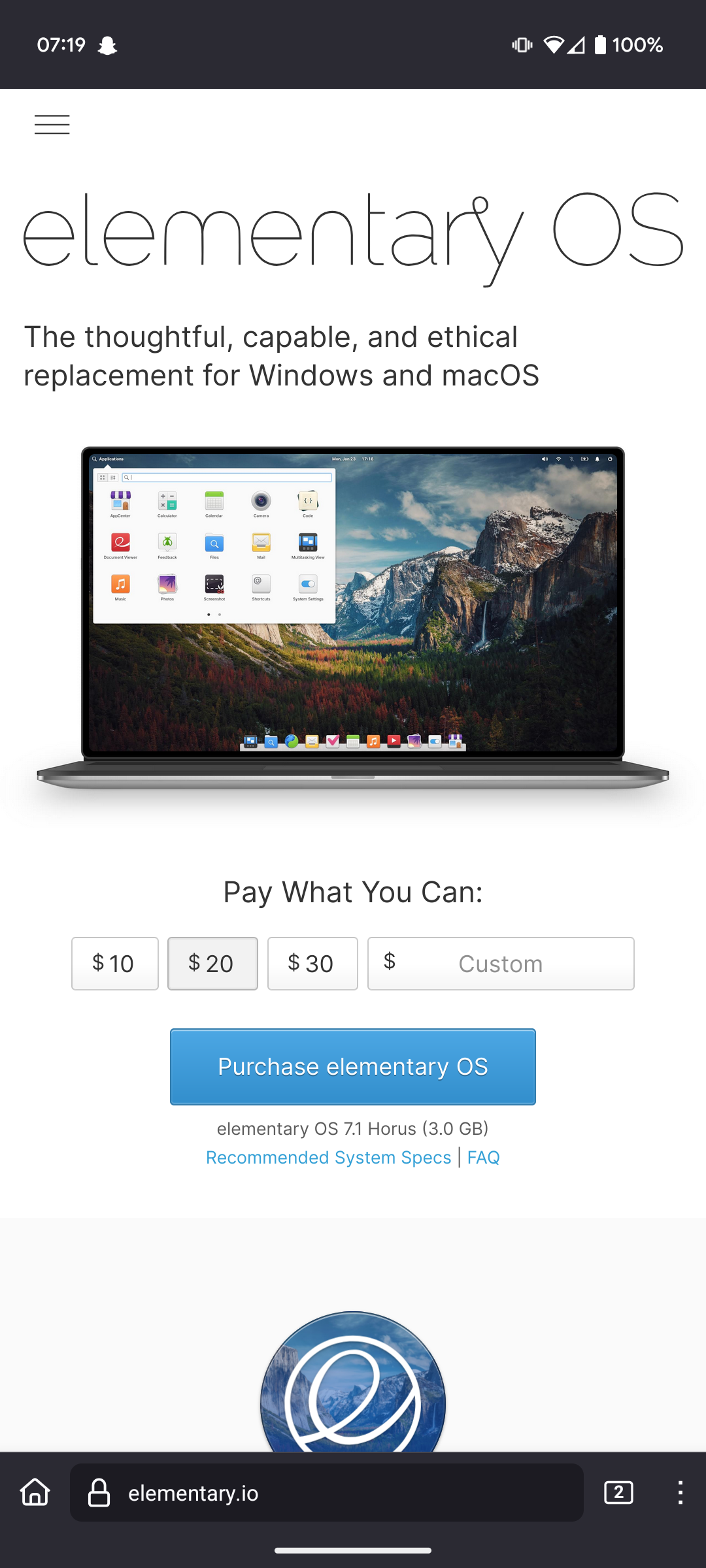elementary OS may not be as much as popular as it used to be.
That being said, elementary OS 8 release is still on the horizon with some useful changes based on Ubuntu 24.04 LTS.
…
However, amidst disagreement between co-founders during the pandemic in 2022, co-founder Cassidy quit the elementary OS team.
Right after that, the development pace took a big hit, and we saw elementary OS 7 being released almost a year after Ubuntu 22.04 LTS came up.
…
A good indicator about its development activity is its upcoming major release, elementary OS 8, based on Ubuntu 24.04 LTS.
I took a sneak peek at it using the daily build, and elementary OS 8 is almost ready to have an RC release.
…
You can expect things like:
- The settings app handles system updates (instead of AppCenter)
- AppCenter is now Flatpak only
- New toggle menu icon giving you easy access to the screen reader, onscreen keyboard, font size, and other system settings
- WireGuard VPN support
Dead like any other Linux distro that is mainly a desktop.
The thoughtful, capable, and ethical replacement for Windows and macOS comes with a carefully considered set of apps that cater to everyday needs
Here’s the issue, elementary OS is made for regular people who want a computer that works, an attempt at replicating macOS, and that same group of people need proprietary software like MS Office that isn’t available under Linux. The alternatives won’t cut it for people once they’ve to collaborate with other who use the proprietary stuff.
elementary OS is essentially a misguided marketing exercise where the founders / company failed to study and understand their target market.
Yup. Same issue will plague all Windows-alternative distros. Unless serious work is done to fix Microsoft 365 and Adobe creative cloud, there’s genuinely little benefit trying to claim Linux is an alternative for all but a minority of people.
That, or we can work on improving the alternatives to those apps. GIMP, Inkscape, and OnlyOffice are on a spectrum of laughably bad to just-about-comparable to their proprietary counterparts.
I don’t think it’s an insurmountable issue: I think there’s more we could do to bring Apple software to Linux (using a BSD-based kernel means a lot less complexity!) and with it the few applications that currently don’t play well with WINE.
Ubuntu, Mint, and to some extent PopOS are pegged as easy Windows/MacOS alternatives, just like ElementaryOS. They’re still popular.
Ubuntu was the “original” easy-to-use Linux desktop. It expanded into that demand and still enjoys the market share it got when nobody else was really filling that niche.
Mint exists explicitly as a fork of Ubuntu and enjoys less success as a result. Many, including me, think Mint does a better job at being a solid desktop option than Ubuntu and is kind of the goto distro for that now ( not still not as popular as Ubuntu still is ).
Elementary is a curated desktop for people that really like coherence and design. That is, first of all, a more demanding target. It is perhaps too ambitious for their scale. And they have stumbled in execution. The task might be easier if they focussed on just being a DE ( desktop environment ) that other distros could use.
An “official” Ubuntu or Mint spin would have a real shot.
Pop is the only one that really ever makes any reference to windows in its marketing. I’m more talking about distros like Zorin which are targeting public sector orgs and windows users by bundling windows compatibility apps and features into the ISO.
The other examples definitely do also target “new users” which of course means Windows users too, but they aren’t explicitly tying their distros to Windows software compatibility the same way some are.
Pop is the only one that really ever makes any reference to windows in its marketing

First line of the the description of Zorin on zorin.com/os
“Zorin OS is the alternative to Windows”
So your take is that instead of trying to make Windows binaries run Linux it would be way easier to just get macOS binaries because it is all BSD. That’s an interesting take indeed.
They are probably saying the shared POSIX underpinnings means greater commonality between macOS and Linux and therefore easier porting. That is likely true to some extent but real apps are written to Apple proprietary APIs and therefore that advantage is largely nullified.
In terms of effort to bring apps over, there has been far, far more effort put into porting Windows apps and so that task ( at this point ) is generally easier. It may have been less effort to port macOS at the start ( eg. GNUstep ) but that work has still largely never been done.
It is easy to move POSIX world apps to macOS. It is not as easy to go the other way.
I think (aka speculate) that the fact that Windows is the largest OS plays into the fact that Linux-Mac compatibility isn’t more developed.
I bet some 90% of desktop software is available on Windows (even many core KDE are on Windows!) so targeting them brings most Apple apps onto Linux “for free”. Especially since Apple’s insistence on trying to make Metal a thing hurts gaming support, which is a big driver behind Linux compatibility development.
The few applications that MacOS has over both Linux and Windows are usually so embedded into the Apple ecosystem that you’re not getting much by porting them anyway. iTunes? The App Store? Garage Band? Probably doesn’t help that many of those apps also use Apple’s own UI framework which isn’t really portable.
However, stuff not designed to live in Apple land like Teams for Mac or Adobe CC might be more possible. But still far too few applications to necessitate the effort to bring them over.
Absolutely.
A lot of it is just the organization and leadership within the projects themselves. The GNUstep guys struggled for a long time. Just agreeing to implement the Mac APIs instead of just the NeXTstep ones is a thing.
Regardless of how attractive projects are, they can be run well or badly. Without trying to disparage anybody, look at the progress of WINE vs ReactOS for example. And if you think it is just because kernels are hard, look at Linux or Haiku or SerenityOS vs ReactOS instead.
But the popularity of Windows made the Win32 APIs more commercially viable as well and so you get companies like CodeWeavers and Valve that really accelerate the WINE effort. That wind at your back really helps.
What happened to elementary OS?
Gnome 4 came out…
Fucking hell you could cut the Reddit-tier snark with a knife.
BSD is more binary compatible than Windows. The fact there’s less MacOS ports on Linux seems to me like a lack of resources, but if you have a reason beyond 🤓☝️ then I’m genuinely interested.
In what way?
The binary formats are not compatible, not even the format of the files themselves. Linux uses ELF. MacOS uses MachO.
True, macOS is more or less POSIX at the base but the API Mac applications are written to is not that at all ( Cocoa ). GNUstep exists for a reason. Sadly, it is not very mature. It is certainly not a trivial undertaking though as there have been a number of attempts over decades and nobody has really pulled it off.
The Win32 API on the other hand has largely been implanted on Linux. A few Win32 APIs are even being added to the kernel.
Going the other way is easier. You can port POSIX stuff to macOS fairly easily.
I’n using Elementary OS right now. It’s been my daily driver for several years on a low powered laptop as a Chromebook replacement. I run browser, messaging, and occasionally some light photo or audio editing.
No complaints. Works great. Solid. Looks great. If you have a similar use case, I recommend it. All of the people ITT talking about what’s wrong with it have not changed my mind that it’s just what I need.
Went to church at templeos
I used it a decade ago and it was my favorite distro
I really want to love Elementary OS, however, its foundation on Ubuntu has me hesitating, as I’m not the biggest fan of Ubuntu lately. If it were built on something like Debian or Fedora, I’d definitely be more inclined to give it a serious try…






